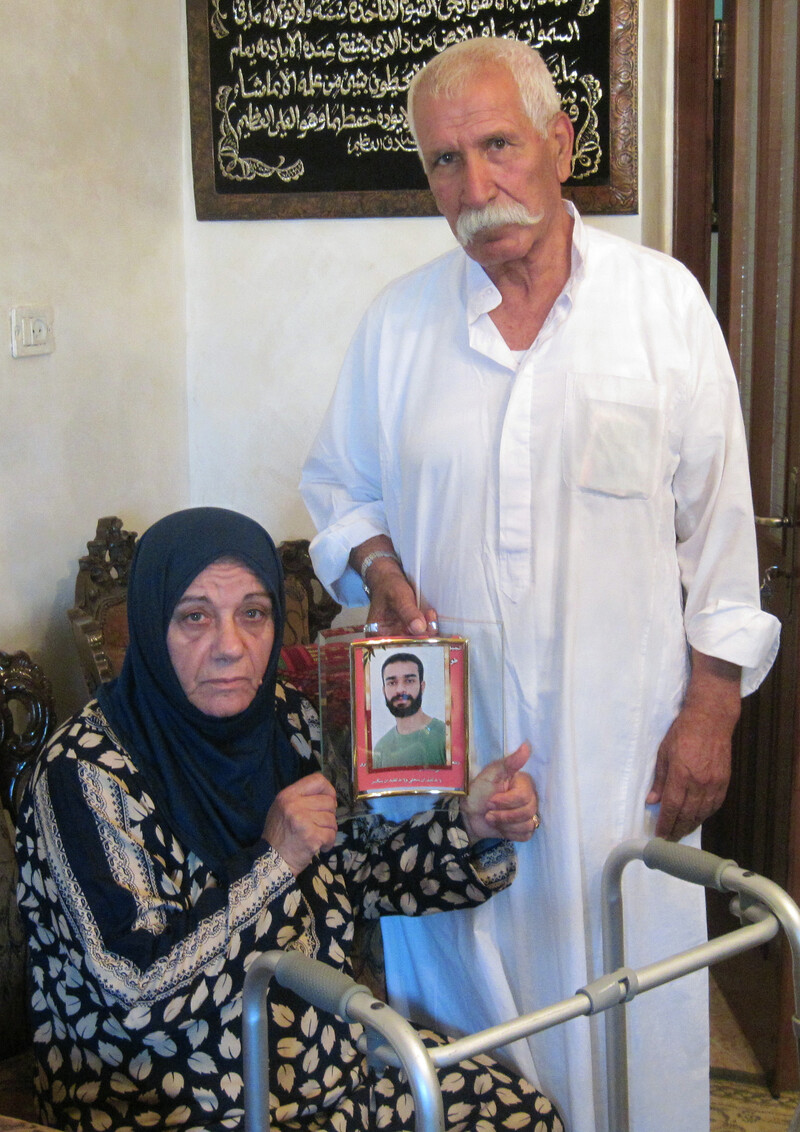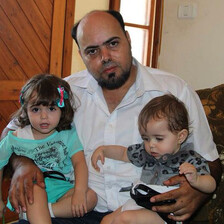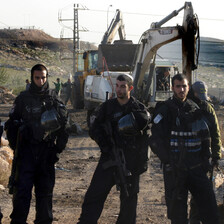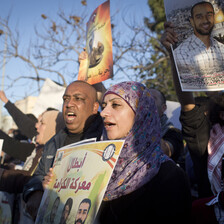The Electronic Intifada Jerusalem 20 August 2012

Samer Issawi’s parents in their Issawiyeh home.
Samer Issawi was freed from Israeli prison after last year’s exchange of a captured Israeli soldier for hundreds of Palestinian prisoners. But today he is awaiting hearings in two Israeli courts, Ofer military court in the occupied West Bank and Israeli Magistrates Court in Jerusalem. According to Samer’s father, his son is one of nine prisoners arrested after being freed in last year’s prisoner exchange deal.
Thirty-two-year-old Issawi is from the Palestinian village of Issawiyeh in Jerusalem. On 15 April 2002, Issawi was captured by the Israeli army in a tower near the Palestinian Authority headquarters in Ramallah during the invasion of multiple West Bank cities, dubbed by Israel “Operation Defensive Shield.” Issawi was sentenced to thirty years in prison on charges of possession of weapons and forming military groups in Jerusalem.
Nearly 10 years later, in October of last year Issawi was released along with 476 Palestinian prisoners as a result of an Egypt-brokered deal between Hamas and the Israeli government.
Prisoners rejected movement restrictions
Jerusalemite prisoners refused to sign the pledge at first, rejecting a condition that restricted their movement to inside Jerusalem.
“The Egyptian ambassador in Tel Aviv visited the prisoners,” recounted Tareq Issawi, Samer’s father. “He told them that these are just formalities and there will be no restrictions on their movement.”
After the ambassador’s promise, Samer signed the deal and was released. But on 7 July 2012, he was arrested in a location between the Palestinian village of Hizma and the Jewish-only settlement Adam, an area within the boundaries of the municipality of Jerusalem. Israel claimed that Samer broke the deal by leaving Jerusalem.
“What is Jerusalem for the Israelis?” wondered Tareq. “Whenever it suits them, they change their definition of Jerusalem! Kufr Aqab is within the jurisdiction of the municipality of Jerusalem. Do they consider it Jerusalem or West Bank?”
Israel annexed East Jerusalem following its occupation of the West Bank after the 1967 War, though it is considered occupied territory under international law. According to the Israeli definition, the boundaries of the municipality of Jerusalem extends north to include the Palestinian village Kufr Aqab. Issawi was captured in a location within the Israeli-defined boundaries of Jerusalem, midway between Kufr Aqab and the center of the city.
Egypt denies responsibility
As soon as he was arrested, Samer’s friends and family planned a sit-in in front of the Egyptian Representative Office in Ramallah. Protesters went home after they received a promise from the Egyptian representative that his government will look into the matter.
“The Egyptian representative told us that they are currently in talks with the Israeli government regarding prisoners and they will reach results after Eid,” said Tareq, referring to the Eid al-Fitr holiday that began last weekend.
The Egyptian ambassador in Tel Aviv denied any responsibility and claimed his government was just a mediator and cannot be held to any promises, according to Samer’s father.
Samer was initially held in the notorious underground Russian Compound — known in Arabic as “Maskobiyeh” — in Jerusalem. On 14 August, he was moved to Nafha prison in the Naqab (Negev) desert. He is currently being tried in two courts, Ofer military court in the West Bank and the Israeli Magistrates Court in Jerusalem.
“They are claiming that since the West Bank military commander signed the swap deal he has to be tried in Ofer,” said Shireen Issawi, a lawyer and Samer’s sister. “They fear that the court in Jerusalem will go soft on him, so they are trying him in a military court that has a very high conviction rate.” In November 2011, the Israeli daily Haaretz reported that the convictions rate in Israeli military courts in 2010 was 99.74 percent (“Nearly 100% of all military court cases in West Bank end in conviction, Haaretz learns”).
Labib Habib, Samer’s lawyer from Nazareth, said that the Israeli military committee is permitted to request the trial of any person in Ofer military court in three cases: if they claim they have secret evidence on a security threat, if the person committed an offense that is usually sentenced to more than three months, or if they claim the person has breached conditions signed upon release.
Habib clarified that the military committee is requesting that Samer serve the remaining of his original sentence. The committee accuses Samer of breaking conditions of his released by entering the West Bank. “It is disputed whether the location of the arrest was considered Jerusalem or the West Bank,” he explained.
Separately, the Israeli Magistrates Court in Jerusalem are trying him on charges that he disobeyed the Israeli military commander in the West Bank’s orders. If convicted, he will be sentenced to time in prison in addition to the rule of the military committee in Ofer military court.
“According to Israeli law, it is legal to put a prisoner in trial in a military court even if he was being tried in a civilian court,” said Habib. “Even if it was not legal, they will make up a law to make it legal. They do what they please.” Samer’s lawyer is currently working on petitioning the legality of the arrest.
Samer’s detention is not the first time the Israeli occupation has taken away one of the Issawi family sons.
Samer’s brother Fadi was murdered at the age of 16 in clashes that erupted following the Ibrahimi Mosque massacre in Hebron in 1994. The protests that erupted in Issawiyeh were met with live bullets from the Israeli army. Fadi was hit with a live bullet in the neck.
After Samer’s release in October 2011, the remaining family gathered around a dining table together for the first time since 1987. In 2010, all the siblings were in prison.
Samer’s brother Medhat, who previously spent an elapsed total of 21 years in prison, was arrested in May of this year on charges of participating in protests in support of the hunger strike undertaken by Palestinian political prisoners held by Israel. Medhat, 37, is being held in Gilboa prison, waiting to be sentenced on 17 September. Meanwhile, his wife is seven months pregnant.
Future plans dashed
A week before his arrest, Samer received an acceptance letter for a small business grant to open a shop selling household supplies. He was involved in community volunteer work, especially with the children in the village. He is also an athlete who enjoyed jogging every morning and had a gym membership.
“On the day he was released, I cooked mansaf for him,” said Samer’s mother, referring to the traditional Palestinian dish. “He could not eat the meat; it was too harsh for him after ten years in prison.
“We were preparing the house for him to get married. He was supposed to get engaged after Ramadan. I nagged him a lot to get married. He promised me that after Eid he would get engaged. I do not know if he was just trying to make me happy. Now they took him and I have to wait.”
Samer went underground for a year and a half before his first arrest in 2002 and so he did not finish his secondary school exams. Although the Israeli prison authorities did not allow it at first, Samer took the exams in 2007 and passed. After that, he was barred from applying for a university degree from prison.
Samer’s court hearing at Ofer is on 23 August and the Jerusalem court date is 5 September. Samer’s father finally had a chance to visit him at Nafha prison for the first time on Sunday; coincidentally, this is the same day for visits to Gilboa prison where his brother Medhat is held. His mother and sister had to miss the visit with Samer to see Medhat.
If Samer is convicted of breaking the conditions of the pledge he signed, he will be held in prison to serve the 20 years that remains of his original 30-year sentence.
“Until this day we have no clue what are the conditions of the deal,” said Tareq. “I am a prisoner’s father and I want to know if I will see my son again or not. No one has answers for us; we need answers.”
Maath Musleh is a Palestinian journalist and blogger based in Jerusalem currently seeking a master’s degree in political journalism from City University in London.





